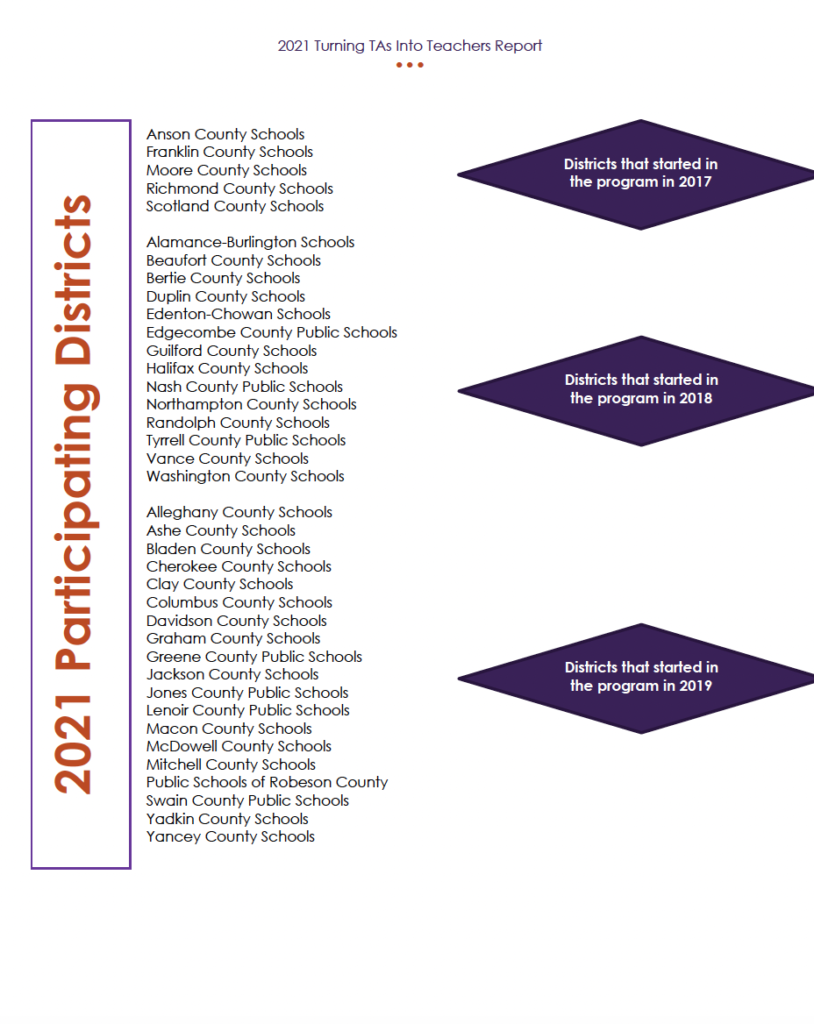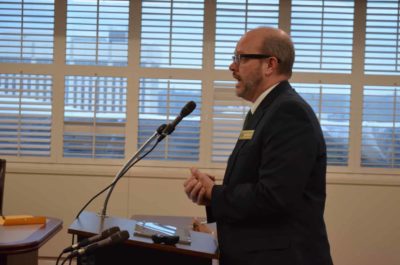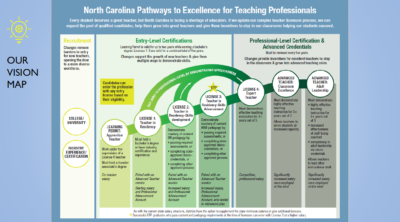

Share this story
|
|
School districts in a North Carolina pilot program are leaving untapped hundreds of thousands of dollars for an initiative designed to help teacher assistants become teachers.
The Teacher Assistants to Teachers Tuition Reimbursement Pilot Program (TAs to Teachers) started in the 2016-17 fiscal year and is open to 38 districts as of 2019. The program helps teacher assistants who want to become teachers with the costs of their education in pursuit of their teacher licensure.
The number of districts able to participate expanded each year from 2017 to 2019. Since 2018-19, funding for the program has been $875,815 per year, but the amount actually being distributed in aggregate is far less.


In 2016-17, the five districts in the program collectively had 16 teacher assistants seeking teacher licensure. About $33,000 total was distributed to teacher assistants to pursue licensure. No teacher assistants became licensed. The funding for that year was $112,500.
In 2017-18, the program added 14 more school districts. The 19 districts in the program collectively had 35 teacher assistants seeking licensure. Almost $90,000 total was distributed to teacher assistants to pursue licensure. Two teacher assistants became licensed. The funding for that year was $427,500.
In 2018-19, 19 more districts were added to the program. The 38 districts in the program collectively had 93 teacher assistants seeking teacher licensure. About $185,000 total was distributed to teacher assistants to pursue licensure. Seven teacher assistants became licensed. The funding for this year — and every year after — was $875,815.
In the 2019-20 school year, the districts in the program collectively had 104 teacher assistants seeking teacher licensure. About $224,500 was distributed to teacher assistants to pursue licensure. Twelve teacher assistants became licensed.
Last year, the districts in the program collectively had 85 teacher assistants seeking teacher licensure. About $267,000 was distributed to teacher assistants to pursue licensure. Twenty-four teacher assistants became licensed.
In total, 45 teacher assistants have been licensed as teachers during the operation of the program.
The program isn’t unlimited. Districts who are part of the program can choose up to five teacher assistants, and those teacher assistants can get up to $4,600 each academic year for four years to use towards tuition for an educator preparation program. Prior to the 2018-19 budget, the max award was $4,500.
Five districts have had no teacher assistants participating in the program since they joined in the second year (2017-18) of the program.
Matthew Cheeseman, superintendent of Beaufort County Schools, says there are different reasons why teacher assistants might not want to participate. It’s possible that balancing life, work, and the education required to become a teacher just isn’t feasible for some. Others may love being a teacher assistant but be less inclined to take on the additional responsibilities that come with being a teacher. Some, Cheeseman said, are turned off by the idea because they feel like teachers aren’t treated well. And sometimes the reason for not participating is doubt.
“I think sometimes you’re just honestly battling with people who don’t have self confidence to know that they can do this work,” Cheeseman said.
According to Toya Kimbrough, educator advancement coordinator for District and Regional Support in the Office of Educational Equity at the state Department of Public Instruction (DPI), the path that teacher assistants in the program take to get licensed varies, but includes completing a bachelor’s degree from an approved educator preparation program.
Teacher assistants in North Carolina are only required to have graduated from high school and possess “an equivalent combination of training and experience which provides the required knowledge, skills, and abilities for the position,” though local boards of education can impose their own requirements.
Jamey Falkenbury, director of government affairs for DPI, said at the State Board of Education meeting this month that many of the districts listed in the pilot can’t access the program because they don’t have an educator preparation program or community college close enough for their teacher assistants to attend.
“So we’re leaving money on the table,” Falkenbury said.
Falkenbury was presenting on State Board and DPI legislative priorities for the upcoming short session of the General Assembly. Among those priorities was changing the TA to Teachers program to a grant program so that districts who can take advantage of the program could potentially seek more funding than they are currently able.
Cheeseman said Beaufort County Schools has three teacher assistants seeking teacher licensure in his district. He hopes that what appears like a small number won’t be construed as evidence that the program isn’t working.
“In the grand scheme of the overall state budget, that doesn’t sound like much, but when you’re talking about one professional educator influencing up to 100 kids, I think it matters,” he said, adding later: “I think honestly that we’re just very appreciative of the opportunities of being able to grow our own.”
And administrators aren’t the only ones grateful for the program. Gladys Winfield is a pre-K teacher assistant at Northeast Elementary School in Beaufort County, and she has taken advantage of the TA to Teachers program.
She first got interested in education 15 years ago when her child started school. She worked as a substitute teacher in every single grade before finding a job she said.
“As I got into the classroom, yes, I wanted to become a teacher more, but I had kids, money — all of that came into play,” she said.


But then there was the TA to Teacher reimbursement pilot. Winfield jumped at the chance, enrolling at the University of Mount Olive in 2019. She is graduating this year.
And as luck would have it, she thinks she already has a job. The teacher that had been running Winfield’s classroom went to another school, and Winfield has since been a substitute. After she graduates, she said she is going to become the teacher for that same class where she has been a teacher assistant for the past decade.
She said that if it weren’t for the TA to Teachers program, this would not have been possible.
“I’m a single parent raising two children, so there is no way I could have afforded it,” she said.
The most recent state budget (on page B33) moved $575,000 of the funding for the TA to Teachers program to non-recurring, meaning that unless lawmakers add that funding back, the program will be cut by $575,000 after 2022-23. Falkenbury told the State Board this month that one of the legislative priorities for the Board and DPI this coming session will be reversing that change.
According to DPI’s statistical profile, there are 20,590 teacher assistants in North Carolina this school year. Leaders of school districts interested in joining the program must petition lawmakers in the General Assembly.
Correction: This article originally included the wrong title for Toya Kimbrough, educator advancement coordinator for District and Regional Support in the Office of Educational Equity at the state Department of Public Instruction.





